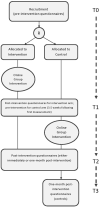Evaluation of a Short-Term Digital Group Intervention to Relieve Mental Distress and Promote Well-Being Among Community-Dwelling Older Individuals During the COVID-19 Outbreak: A Study Protocol
- PMID: 33898369
- PMCID: PMC8062707
- DOI: 10.3389/fpubh.2021.577079
Evaluation of a Short-Term Digital Group Intervention to Relieve Mental Distress and Promote Well-Being Among Community-Dwelling Older Individuals During the COVID-19 Outbreak: A Study Protocol
Abstract
Older individuals are at an increased risk of experiencing adverse social and health consequences due to both the COVID-19 pandemic and the measures taken to manage it, such as social distancing. To promote community-dwelling older individuals' well-being during this time, the aims of the current project are to develop effective strategies in order (a) to increase older individuals' digital literacy, and (b) to help them acquire behavioral and cognitive skills that will improve their coping abilities with the stressful situation created as a result of the pandemic, as well as reducing adverse mental health effects. The project comprises an intervention arm that includes digital group sessions for older individuals meant to improve their digital literacy, promote their effective coping, and relieve their mental distress and loneliness. Subjects receive a short-term (seven sessions), twice-weekly, digitally guided group intervention through Zoom (a video conferencing app), and WhatsApp (instant messaging app). The wait list control-group participants receive twice-weekly telephone calls from a research assistant during a parallel period. Web-based questionnaires are filled in pre- and post-participation. The effectiveness of the intervention will be analyzed by comparing pre- and post-measures, between intervention and control groups. This protocol offers a model for helping to support vulnerable populations during the COVID-19 pandemic. However, it is applicable regardless of the outbreak of a global health crisis or the imposition of lockdown rules; in fact, it has the potential to contribute to the social inclusion of vulnerable populations during routine times as well as during emergencies. Furthermore, ideas for future expansion include the integration of multilingual facilitators in order to reach seniors from underserved minority groups in various social contexts, even across borders.
Keywords: COVID-19; cognitive-behavioral skills; digital group interventions; mental health and well-being; older individuals.
Copyright © 2021 Shapira, Yeshua-Katz, Goren, Aharonson-Daniel, Clarfield and Sarid.
Conflict of interest statement
The authors declare that the research was conducted in the absence of any commercial or financial relationships that could be construed as a potential conflict of interest.
Figures


References
-
- World Health Organization . Coronavirus Disease 2019. (2020). Available online at: https://www.who.int/emergencies/diseases/novel-coronavirus-2019 (accessed May 11, 2020]
Publication types
MeSH terms
LinkOut - more resources
Full Text Sources
Other Literature Sources
Medical

